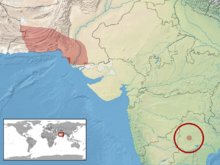Hemidactylus imbricatus
| Carrot-tail viper gecko | |
|---|---|
| Scientific classification | |
| Kingdom: | Animalia |
| Phylum: | Chordata |
| Class: | Reptilia |
| Order: | Squamata |
| Family: | Gekkonidae |
| Genus: | Hemidactylus |
| Species: | H. imbricatus |
| Binomial name | |
| Hemidactylus imbricatus Bauer, Giri, Greenbaum, Jackman, Dharne, and Schouche, 2009 | |
 | |
| Synonyms | |
|
Homonota fasciata Jerdon, 1854 | |
Hemidactylus imbricatus (carrot-tail viper gecko) is a species of gecko.[1][2] It is found in Pakistan and possibly India,[1] although the Indian records are questionable.[2]
Taxonomy
This species was formerly known as Teratolepis fasciata, but after Teratolepis was brought to synonymy with Hemidactylus, this species would have become a junior secondary homonym of Hemidactylus fasciatus Gray 1842. Thus a nomen novum was needed.[2]
Description
Body somewhat depressed; limbs rather long and slender. Head covered with polygonal flat scales. Seven lower labials; mental large, triangular; two larger anterior chin-shields, in contact behind the mental, followed by others passing gradually into the small gular granules. Dorsal scales large, lozenge-shaped, slightly keeled; ventral scales much smaller, smooth. Tail depressed, swollen, tapering at the end, covered with imbricate irregular scales, some of those of the upper surface being extremely large. Greyish above, with five brown longitudinal bands, which at regular intervals are interrupted by white spots forming cross bands; seven of these cross bands on the neck and trunk.[3]
Head and body 1.5 inches in length. The species has been noted from Jalna in the Deccan region according to Boulenger but this may refer to Hemidactylus albofasciatus.
References
- 1 2 3 Khan, M.S.; Papenfuss, T.J. (2010). "Hemidactylus imbricatus". IUCN Red List of Threatened Species. IUCN. 2010: e.T178490A7557518. Retrieved 15 March 2017.
- 1 2 3 Hemidactylus imbricatus at the Reptarium.cz Reptile Database. Accessed 15 March 2017.
- ↑ Boulenger, G. A. 1890. Fauna of British India. Reptilia and Batrachia.
